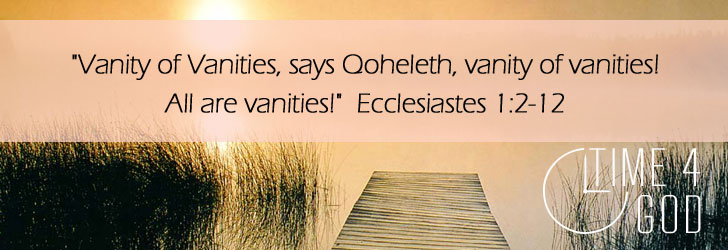Reality v. Illusion
These opening lines of the book of Ecclesiastes are well known to us. They are the first salvo in a long and very important reflection on the meaning of life, in the midst of suffering.

These opening lines of the book of Ecclesiastes are well known to us. They are the first salvo in a long and very important reflection on the meaning of life, in the midst of suffering. It is a reflection on the reality of our finite, earthly lives, in contrast with our illusions about it. The author reflects on the idea of vanity (hebel in Hebrew), which has the sense of emptiness, futility and absurdity. He says, ʺI have seen all things that are done under the sun, and behold, all is vanity and a chase after wind.ʺ (Eccl. 1:14) The book’s tone is one of honest skepticism, and it is a blunt appraisal of the human condition. Though the tone is skeptical, it is tempered by a kind of simple wisdom: to give thanks—in the moment— for whatever temporary gifts God gives us.
It is true that our lives are short and that there is much in them that is suffering, but there is nothing on earth that is permanent, nothing that is eternal. Generations come and go and are forgotten. The sun has risen and set on every day for every human being that has ever lived, just as it does for us now, and will for as long as the earth lasts. The wind goes where it will go, and all rivers flow to the sea, but the sea is never filled up, even though the rivers continue to flow into it. Qoheleth, the author, recognizes that, ʺWhat has been, that will be; what has been done, that will be done. Nothing is new under the sun.ʺ (Eccl.1:9)
[content-ad]
What is ʺvanity,ʺ then? It is the result of thinking that our happiness comes from the things of this world. We live in the middle of a paradox all the time. We are both finite beings and eternal beings. Our physical lives on earth are short, indeed, minuscule in relation to eternity, yet our souls are meant for eternity. Our lifelong struggle on earth is to recognize that we look at the world and its ʺpromisesʺ with finite eyes. And because of this, we tend to put our hopes and dreams in temporary and passing earthly values like power, fame, and fortune. But these are nothing more than a puff of smoke that appears briefly and then disappears in the reality of eternity. They will not save us. They cannot save us. If they give us pleasures, those pleasures are merely temporary, for they come and go like the wind. Even if they have the appearance of lasting a lifetime, they last only until death. Then they are gone, forever. We cannot take them with us.
Yet we have within us the instinct for eternity as well. Our struggle then is to see that the things of this world are finite and, therefore, vanities. It is the eternal things that we want to learn to keep our eyes on. We must learn to put our hope in eternal things alone. The eternal things, unlike finite vanities, transcend past, present, and future, for they exist always. Their value does not fade, does not corrode, and never dies.
Qoheleth is, if nothing else, real. He may be looking at life through a slightly cynical eye, due to the condition of his people and himself under the harsh rule of the Greek kings of Egypt at the time, but he is giving us some very important insights to contemplate in our own time. We, unlike Qoheleth, have the advantage of history and the Incarnation of Jesus Christ to add to our reflections as well. Because of Jesus we can see the vanity of earthly, finite things, and how those vanities can tempt us away from the eternal things. In Jesus we have also seen what our lives can and ought to be like. We know that life is a mix of suffering and finite joys, but also that if we walk in the footsteps of Jesus we will be walking in the ways of eternal life.
Because of Jesus we have come to know that it is the things that we ʺdoʺ for others, out of love, that are directly connected to eternity. We know that when we sacrifice from our earthly substance of wealth, not just our surplus; when we use our power, whatever power we might have, for the good of others; when we serve all others out of love, it is because we have put our whole faith in what is eternal. It is when we have our eyes fixed on God that we see and act as creatures made for eternity. Let us keep our eyes on God then. Let us not put our hopes in finite and passing things, but in the eternal, loving will of God.
SKM: below-content placeholderWhizzco for FHB

